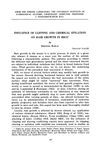 284 citations,
February 2008 in “Pediatrics”
284 citations,
February 2008 in “Pediatrics” Chemicals and body size might change when puberty starts and progresses, but more research is needed to confirm this.
 159 citations,
July 2006 in “Endocrine Reviews”
159 citations,
July 2006 in “Endocrine Reviews” Estrogens significantly influence hair growth by interacting with receptors in hair follicles and may help regulate the hair growth cycle.
 42 citations,
May 2016 in “Annual Review of Cell and Developmental Biology”
42 citations,
May 2016 in “Annual Review of Cell and Developmental Biology” Fat cells are important for tissue repair and stem cell support in various body parts.
 28 citations,
October 1998 in “Baillière's clinical endocrinology and metabolism”
28 citations,
October 1998 in “Baillière's clinical endocrinology and metabolism” Testosterone replacement may help post-menopausal women with androgen insufficiency, but more research is needed on its benefits and risks.
 7 citations,
July 1999 in “In Practice”
7 citations,
July 1999 in “In Practice” The conclusion is that a systematic approach is key for treating symmetrical alopecia in dogs, but treatment may not always be necessary.
 5 citations,
September 2021 in “Southern African Journal of Hiv Medicine”
5 citations,
September 2021 in “Southern African Journal of Hiv Medicine” The guideline provides healthcare professionals in South Africa with instructions for comprehensive, multidisciplinary gender-affirming care, including HIV prevention and treatment for transgender and gender diverse individuals.
 3 citations,
November 2010 in “Rheumatic Diseases Clinics of North America”
3 citations,
November 2010 in “Rheumatic Diseases Clinics of North America” Pregnancy can cause symptoms similar to rheumatic diseases, making diagnosis difficult, and affects various body systems, requiring careful distinction between normal changes and serious conditions.
 2 citations,
October 2003 in “Australian Prescriber”
2 citations,
October 2003 in “Australian Prescriber” The 2003 Australian Medicines Handbook was a clear, concise drug reference guide, updated with new topics and evidence, and considered essential for medical practice.
 1 citations,
October 2022 in “Adolescent Health, Medicine and Therapeutics”
1 citations,
October 2022 in “Adolescent Health, Medicine and Therapeutics” Gender-affirming therapy can cause skin issues like acne and hair loss in transgender adolescents, and more research is needed on its dermatological effects.
 September 2021 in “Physiology News”
September 2021 in “Physiology News” The document concludes that more inclusive research involving the transgender community is needed, especially on the neovaginal microbiome of trans women.
 18 citations,
June 2019 in “Clinical research in dermatology”
18 citations,
June 2019 in “Clinical research in dermatology” Acne can't be cured but can be managed with treatments like benzoyl peroxide and diet changes; it's costly and can lead to scarring and mental health issues.
 December 2022 in “Cosmetics”
December 2022 in “Cosmetics” The food supplement improved hair growth and strength in people with a certain type of hair loss and had no major side effects.
 4 citations,
December 2021 in “Experimental and Therapeutic Medicine”
4 citations,
December 2021 in “Experimental and Therapeutic Medicine” Adult female acne is complex and requires a combination of treatments for effective management.
61 citations,
April 2018 in “Frontiers in endocrinology” Sex steroids produced in the hippocampus are crucial for brain functions like memory and learning in rodents.
 4 citations,
January 2019 in “PubMed”
4 citations,
January 2019 in “PubMed” Patterned hair loss in women is linked to hormonal imbalances and biochemical changes, and should be evaluated for underlying health issues.
 August 2021 in “Annals of Agricultural and Environmental Medicine”
August 2021 in “Annals of Agricultural and Environmental Medicine” The article concludes that understanding Frontal Fibrosing Alopecia (FFA) is crucial for effective treatment, which includes medication like 5α-reductase inhibitors and hydroxychloroquine.
 9 citations,
January 2015 in “Skin appendage disorders”
9 citations,
January 2015 in “Skin appendage disorders” The article suggests that the belief in common postpartum hair loss lacks sufficient evidence and may be overestimated.
 January 2018 in “Springer eBooks”
January 2018 in “Springer eBooks” The document says that early treatment of Acne Vulgaris is important to prevent scarring and that adult onset acne is common in women, often due to hormonal imbalances.
 128 citations,
March 2006 in “American Journal of Pathology”
128 citations,
March 2006 in “American Journal of Pathology” Prolactin contributes to hair loss by promoting hair follicle shrinkage and cell death.
 34 citations,
May 2013 in “Journal of the European Academy of Dermatology and Venereology”
34 citations,
May 2013 in “Journal of the European Academy of Dermatology and Venereology” Hair growth slows and shedding increases after childbirth, but most women don't experience excessive hair loss.
 16 citations,
August 1967 in “JAMA”
16 citations,
August 1967 in “JAMA” Oral contraceptives may cause hair loss in women.
 99 citations,
June 1999 in “The Journal of Clinical Endocrinology and Metabolism”
99 citations,
June 1999 in “The Journal of Clinical Endocrinology and Metabolism” Testosterone replacement may help some postmenopausal women with symptoms like fatigue and low libido, but more research is needed to fully understand its effects.
 96 citations,
September 2008 in “Seminars in Cutaneous Medicine and Surgery”
96 citations,
September 2008 in “Seminars in Cutaneous Medicine and Surgery” Hormonal treatments, including birth control and antiandrogens, can effectively treat acne in women.
 91 citations,
May 2003 in “American Journal of Pathology”
91 citations,
May 2003 in “American Journal of Pathology” Prolactin affects hair growth cycles and can cause early hair follicle regression.
 37 citations,
January 2019 in “Dermatologic Therapy”
37 citations,
January 2019 in “Dermatologic Therapy” A dietary supplement with Boswellia serrata, Curcuma longa, and Vitis vinifera showed potential improvement in hair health for telogen effluvium patients, but more research is needed.
 36 citations,
November 2009 in “Journal of Investigative Dermatology”
36 citations,
November 2009 in “Journal of Investigative Dermatology” Prolactin may affect hair growth differently based on gender and scalp area.
 14 citations,
October 2020 in “Natural Products and Bioprospecting”
14 citations,
October 2020 in “Natural Products and Bioprospecting” Various treatments, including FDA-approved drugs, natural products, and oral supplements, can help with hair loss, but a patient's medical history and potential allergies should be considered when choosing a treatment.
 11 citations,
February 2013 in “Clinical Endocrinology”
11 citations,
February 2013 in “Clinical Endocrinology” A small number of premenopausal female blood donors had high prolactin levels, often due to stress, and retesting is recommended to prevent misdiagnosis.
 10 citations,
December 2002 in “International Journal of Dermatology”
10 citations,
December 2002 in “International Journal of Dermatology” Cyproterone acetate can cause rare shortness of breath in women.
 8 citations,
September 1958 in “Acta pathologica et microbiologica Scandinavica”
8 citations,
September 1958 in “Acta pathologica et microbiologica Scandinavica” Certain treatments can speed up local hair growth in mice but don't change the overall hair growth pattern.





























